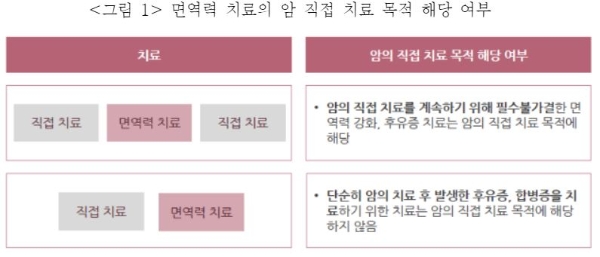
/ Photo = Insurance Institute
[한국금융신문 유정화 기자] Disputes continue over whether inpatient treatment in nursing hospitals is covered by cancer insurance as a case of hospitalization for the direct purpose of cancer treatment. Among these, it is not a matter that can be concluded unequivocally whether it is eligible for payment of cancer hospitalization fees, and it was argued that individual cases should be judged according to specific facts.
On the 7th, a researcher at the Insurance Research Institute Baek Hwa-wa said in a report on the’Review of the Dispute on Hospitalization Fees for Nursing Hospitals’ published in Insurance Law Review No. 9, “It is simple to judge whether hospital inpatient treatment is indispensable for future cancer treatment. It is not clear,” he said.
In recent years, disputes over the cost of hospital stays related to cancer insurance products have continued. According to the terms and conditions of cancer insurance products that cover cancer hospitalization fees, not all insurance payments are paid for hospitalizations that are even slightly related to cancer. “The insured is diagnosed with cancer after the start date of cancer coverage, and the direct purpose of treating the cancer is It is the reason for the payment of insurance premiums only if you are hospitalized with
A dispute arose between consumers and insurance companies as to whether a patient was admitted to a nursing hospital during or after cancer treatment, and if this corresponds to a case where the patient was admitted for the direct purpose of cancer treatment. Since admission to a nursing hospital can be viewed as an extension of cancer treatment, there is a confrontation between the position that admission to a nursing hospital is eligible for payment of cancer hospitalization fees, and that admission to a nursing hospital to strengthen immunity cannot be viewed as a direct purpose of cancer treatment. It is a situation.
A number of complaints have been filed in connection with such disputes over hospitalization costs in nursing hospitals, and protests against insurance companies continue. According to the Financial Supervisory Service, 2125 complaints were filed in relation to cancer hospitalization fees in 2018, which also contributed to a significant increase in complaints against life insurance companies compared to the previous year.
Representatively, there is a group of cancer patients (boammo) that responds to insurance companies. They have occupied Samsung Life’s customer center and continue to protest due to a conflict with cancer insurance nursing hospital hospitalization fees. The Supreme Court raised Samsung Life’s hand in the lawsuit filed by CEO Boammo, but at the end of last year, the Financial Supervisory Service disregarded the ruling that the court did not have to pay, and imposed severe punishment on Samsung Life.
Regarding whether hospitalization in a nursing hospital corresponds to hospitalization for the direct purpose of cancer treatment, precedents and dispute settlement cases provide a standard of coherence.
The court recognized that the purpose of the treatment of cancer was to eliminate cancer or to suppress the proliferation of cancer, or to ameliorate serious pathological symptoms directly expressed by the cancer itself or the growth of cancer. However, in the case of alleviating the sequelae caused by cancer or cancer treatment or to treat complications, the treatment of cancer was not recognized as a direct purpose.
In the case of dispute settlement by the Financial Supervisory Service, hospitalization for the direct purpose of cancer treatment means hospitalization to receive cancer treatment, which is interpreted as the same meaning as hospitalization necessary for cancer treatment.
Research Fellow Baek Yeong-hwa said, “If it is indispensable to be admitted to a nursing hospital while cancer treatment is continuing to strengthen immunity and treat sequelae in order to continue cancer treatment in the future, admission to the relevant nursing hospital is also necessary for the treatment of cancer. He said, “However, even in this case, it is not a simple or clear matter to judge whether inpatient treatment in a nursing hospital is indispensable for the cancer treatment that will continue in the future.”
“In the end, it is not a problem to judge that the hospital admission fee is or is not subject to the payment of the cancer hospitalization fee in the end, and the conclusion will vary depending on whether admission to the nursing hospital is indispensable for cancer treatment in individual cases. I can.”
Reporter Yoo Jeong-hwa [email protected]